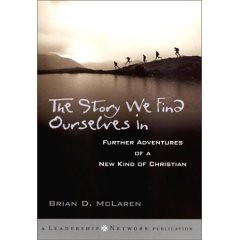In this continuation of Neo and pastor Dan’s story, McLaren does not succeed in giving us much that is genuinely insightful or with great impact. Besides a couple of genuine moments in the story line in which characters appear to come to terms with God and their spirituality (even then, though, McLaren is extremely shy of the concept and the word “conversion”), there is not much in either the fiction or the theology to recommend.
One general point of critique would be the postmodern penchant for story and dialogue in which no clear point is made and, allegedly, no side is taken. As philosophers no less than Aristotle and Davidson have pointed out, a good story or metaphor has a plot or makes a point. What is a metaphor or a story but a clever and unique way of saying something fairly specific? Dialogue simply for the sake of dialogue is basically (and maybe literally) meaningless. Christ did not speak in parables in order not to make a point.
As for the theology, most of what McLaren has to say in this second part of his trilogy is wrapped in politics, an obvious adherence to evolution, and his clear aversion things traditionally evangelical. The only “bad guys” in this work are caricatures of traditional evangelicals. At times McLaren seems to toy with Monism, Pelagianism, and a general lack of definition of sin and redemption. The concept of redemption looms large in his book, but it is difficult to pinpoint exactly what needs to be redeemed except white evangelicals and conservative politics. In other words, sin does not play the role it needs to in order for McLaren’s version of redemption to be meaningful.
At one point near the end of the story when McLaren is laying the foundation for the third book’s plot, his theology hits the surface. Dan and Neo are reflecting on the death of one character and Dan is questioning him about heaven and hell. Neo is talking around the issue and Dan presses him on the point. Neo’s, and apparently McLaren’s, response is, “Why do you always need to ask that question?” Neo then continues to evade giving a clear or distinct answer to the question. The answer to why the question of heaven and hell needs to be answered is obvious-because it is the one final question every single human being ever born needs to face. Seems to me that a caring and thoughtful response would not be a gloss but an answer.
Unless you are interested in understanding the theology of the emergent church movement, I would not recommend this book.

No comments:
Post a Comment